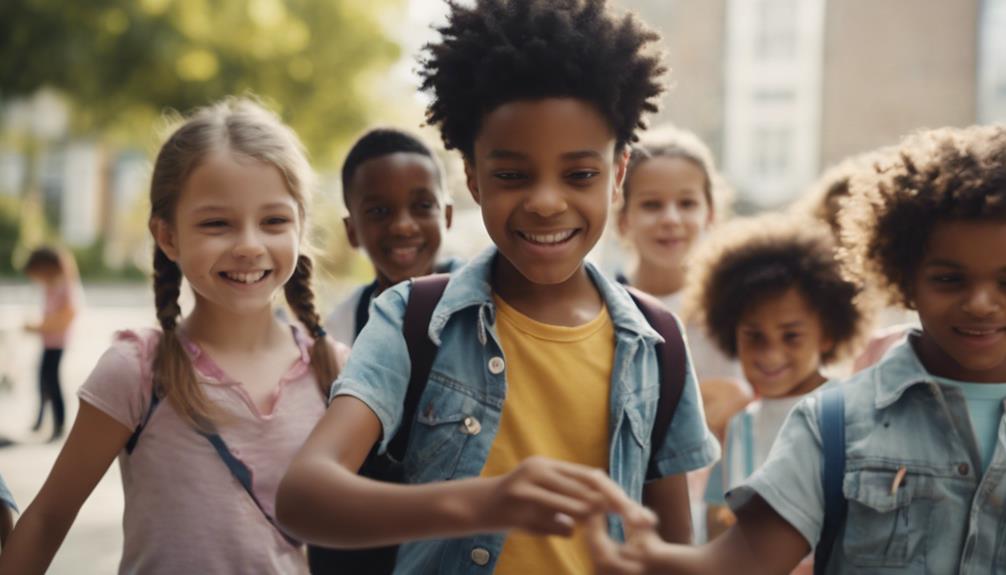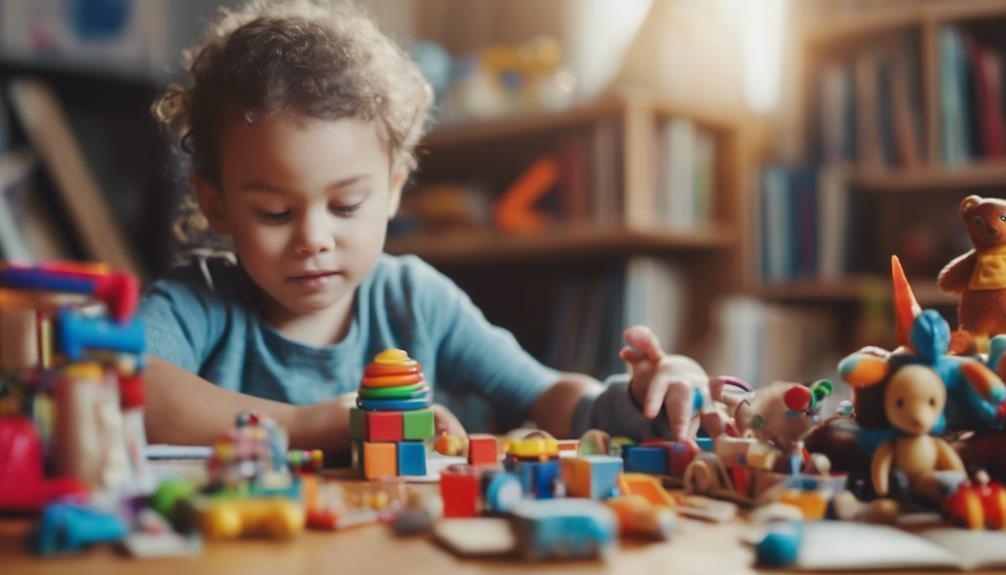Engage children in role-playing, team building, emotional intelligence exercises, creative communication games, and cooperative problem-solving tasks. These activities enhance social skills by improving teamwork, problem-solving, and communication. Role-playing encourages creativity and empathy, while team building fosters unity and readiness for future challenges. Emotional intelligence exercises help develop awareness and conflict resolution skills. Creative communication games assist in starting conversations and increasing confidence. Cooperative problem-solving tasks promote critical thinking and collaboration. Explore additional methods to enhance children’s social skills through interactive activities.
Key Takeaways
- Role-playing games foster creativity and social skills.
- Team building activities enhance problem-solving and teamwork.
- Emotional intelligence exercises improve communication and conflict resolution.
- Creative communication games boost confidence and conversational skills.
- Cooperative problem-solving tasks develop critical thinking and teamwork abilities.
Role-playing and Dramatic Games
Engage children in role-playing and dramatic games to enhance their social skills and foster creativity. Through these activities, kids can immerse themselves in various roles, allowing them to practice social interactions, empathy, and problem-solving.
By stepping into different characters, children learn to navigate real-life social situations with confidence and understanding.
Role-playing games not only stimulate creativity and imagination but also promote cooperation and teamwork among children. As they work together to create scenarios and solve challenges, kids develop a sense of camaraderie and mutual support.
These activities provide a safe space for children to experiment with different social dynamics and communication styles, building essential skills for future interactions.
Encouraging children to participate in role-playing and dramatic play activities can have lasting benefits, boosting their self-esteem and overall social development. By incorporating these games into their routine, kids can enjoy a fun and engaging way to enhance their social skills while exploring the depths of their imagination.
Team Building Activities

To instill collaboration and communication skills in children and teens, involve them in interactive and engaging team-building activities. These activities are designed to promote problem-solving, creativity, and teamwork among participants.
From cooperative drawing games to physically active games like Islands and Timeball, team-building activities offer a diverse range of experiences. Community gardening and team athletics are excellent options to foster a sense of unity and cooperation among youngsters.
Participating in team-building activities not only enhances social relationships but also boosts self-esteem and overall social skills development. Through these experiences, kids and teens learn the importance of working together towards a common goal, effectively communicating ideas, and appreciating the value of each team member's contributions.
Encouraging collaboration and cooperation through team-building activities can have a lasting impact on young individuals, preparing them for future challenges where teamwork is essential for success.
Emotional Intelligence Exercises
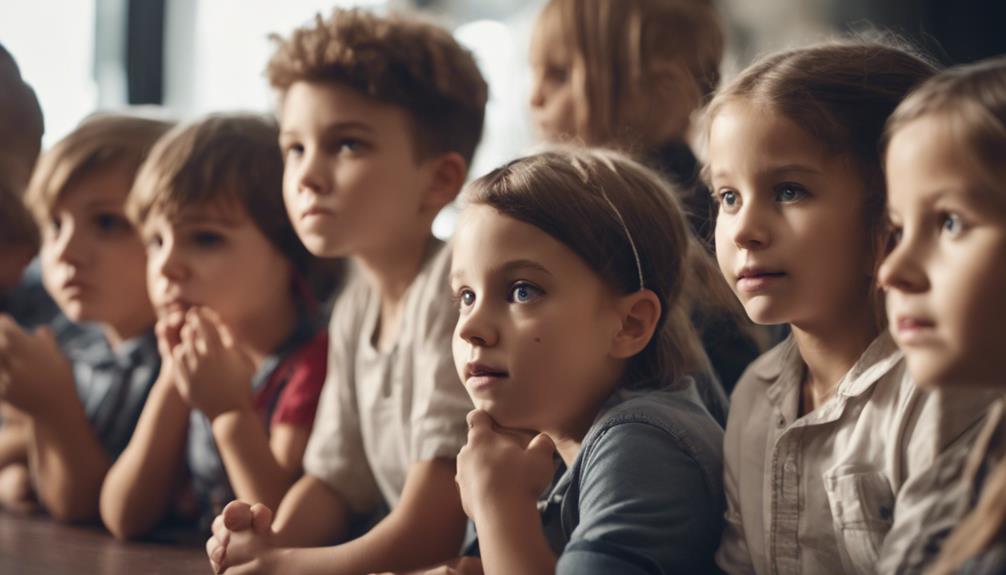
Children can enhance their emotional awareness and management skills through engaging in various emotional intelligence exercises. These activities help kids recognize and regulate their own emotions effectively while also focusing on understanding and empathizing with others' feelings.
By participating in emotional intelligence exercises, children can improve their communication, problem-solving, and conflict resolution skills. These exercises also aid in the development of self-awareness and social awareness, vital components for building strong relationships and promoting emotional well-being.
Through practicing emotional intelligence activities, kids can learn to navigate their emotions and interactions with others more effectively, leading to healthier and more fulfilling social connections. Encouraging children to engage in these exercises from a young age can lay a strong foundation for their emotional intelligence, setting them up for success in managing emotions and relationships as they grow.
Creative Communication Games
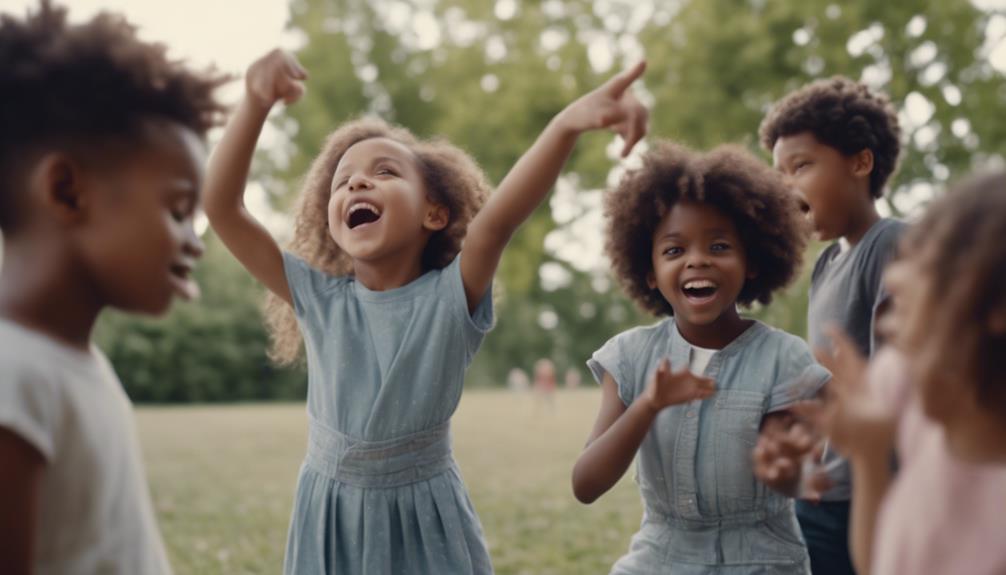
How can creative communication games benefit kids' social skills development? Engaging in communication games offers a fun and interactive way for children to enhance their social abilities. Here are some activities that can help:
- Role-playing: By acting out different communication scenarios, kids can practice effective ways to interact with others, improving their communication skills.
- Conversation Starters: These tools provide prompts for discussions, helping children learn how to initiate and maintain conversations, fostering better communication habits.
- Puppet Show: Through puppetry, children can practice self-introductions and explore social interactions in a creative way, boosting their confidence and social skills.
These games also encourage active listening, asking questions, and using whole-body listening techniques, which are essential for effective communication.
Additionally, playing games like 'Would You Rather' can help children develop their conversational skills while having fun. Incorporating these activities into children's routines can greatly contribute to their social skills development.
Cooperative Problem-Solving Tasks
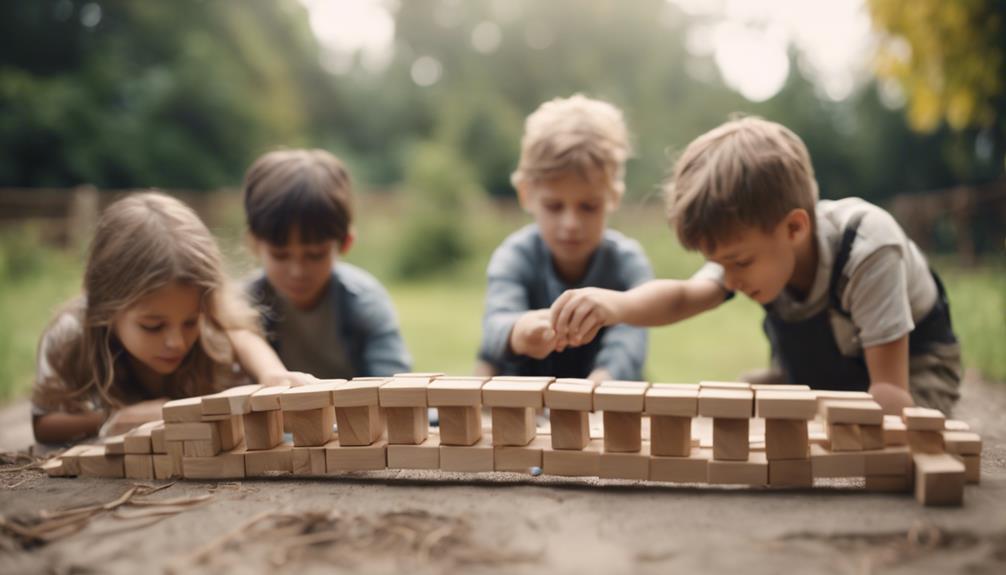
Engaging in cooperative problem-solving tasks with other kids can foster teamwork skills and critical thinking abilities in a collaborative setting. These group activities not only encourage children to work together but also help them develop essential communication skills. By facing challenges as a team, kids learn the value of sharing ideas, listening to others, and working towards a common goal.
Tasks like building a structure with limited resources or solving a mystery together require children to think critically and communicate effectively to find solutions. Working in a team setting allows children to pool their strengths, overcome obstacles, and achieve success collectively.
Through these cooperative problem-solving tasks, kids not only enhance their problem-solving abilities but also cultivate a sense of unity and mutual support within the group. Tailored to different age groups and skill levels, these activities provide engaging and educational experiences that promote collaboration and critical thinking in a fun and interactive way.
Frequently Asked Questions
What Activities Help Children Develop Social Skills?
To develop social skills, engage in turn-taking games, group dramatic play, and music-making activities. These activities promote teamwork, empathy, and communication. Cooperative drawing, physically active group games, and community gardening foster collaboration and enhance social interaction.
How to Develop Social Skills in Kids?
To develop social skills in kids, engage them in turn-taking games, cooperative drawing activities, and role-playing scenarios. Encourage emotional intelligence through gratitude exercises and practice active listening skills with games like checker stack and passing the ball.
What Is a Social Development Activity?
Wondering what a social development activity is? It's an engaging way to enhance communication, empathy, and problem-solving. Activities like games, role-playing, and group projects help you improve relationships, teamwork, and emotional intelligence.
What Are Pro Social Activities for Children?
Engage in prosocial activities to foster empathy and teamwork among children. Encourage gratitude, cooperation, and kindness challenges. These activities promote positive social behaviors, enhancing relationships and emotional intelligence. Cultivate a sense of community and mutual respect.
Conclusion
To sum up, engaging in activities that promote social skills development in kids is essential for their overall growth and success.
By participating in role-playing, team building, emotional intelligence exercises, creative communication games, and cooperative problem-solving tasks, children can enhance their ability to interact effectively with others.
These activities not only foster collaboration and communication but also help build resilience and empathy.
Encourage children to participate in these activities to cultivate strong social skills that will benefit them throughout their lives.

